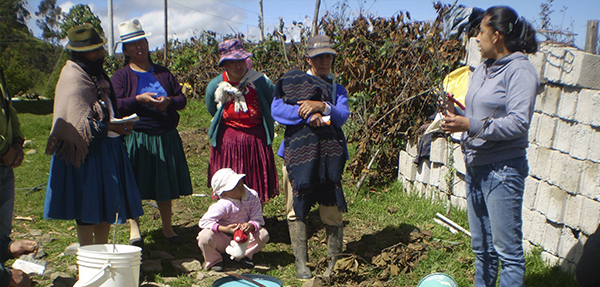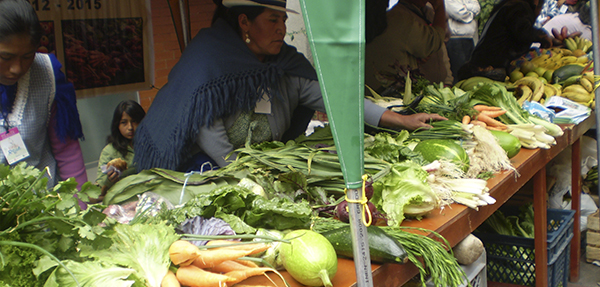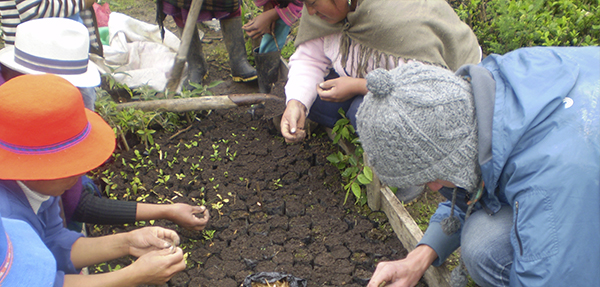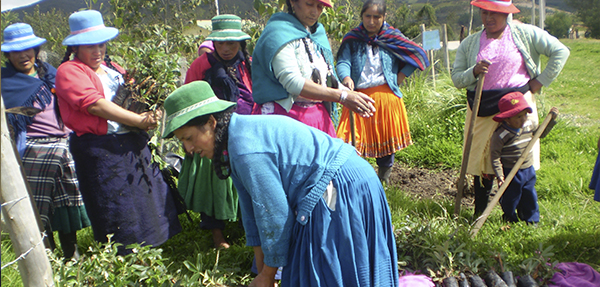The reforestation in Quingeo parish was initiated in 1998. Quingeo is one of the parishes whereby majority of the land is eroded, due to bad use of the soil, felling of trees, frequent fires, the disappearance of shrub-oaks due to the extension of agriculture and over-herding, abandonment of the fields due to immigration, etc. and above all the lack of orientation and consciousness of the population about respect and living in harmony with nature. Today the communities in the parish have a big percentage of eroded land that is useless for agriculture.
Due to this reality, the parish socio-pastoral office, with coordination with the communities, has established programs of reforestation that go along with those of production, that has proceeded from an even larger program of formation and capacity building of the population, dealing with topics related to the care and protection of water catchment areas, the danger and the consequences of the fires, the importance of reforestation and recovery of indigenous plants. In the year 1998, 6000 plants of different varieties were planted. From this experience, the desire to continue with the reforestation combining with the reality of the parish emerged.
Importance
Reforestation is very important to recover life. It makes the soil stable, conserves water, purifies the air, etc. Through the leaves that fall, the trees provide organic material, fertilizing the soil, increasing its volume and its capacity to absolve water. Reforestation increases also the capacity of the soil to retain water from the hills. During the rainy season, they minimize the flooding of the rivers; at the same time enabling them to retain enough water during the dry winter season. The bushes improve the quality of the landscape of the area.
Reforestation is an exercise of all. For that matter, there is urgency to begin with this activity in all the communities of the parish and in the whole world at large. It starts with the pastoral agents and the catechism children, bearing in mind that these are more conscious and want to give an example to others; and later on through the development projects, to work with the people about the matter, because the results are every day more noticeable especially in the agriculture and livestock fields. For this reason there were initiated agro-forest farms, live-fences and micro-reservoirs. In order to produce the plants in the same area, 6 tree nurseries were built in the parish communities whereby the same people from the communities, guided and supported by the development projects, grow different varieties of forest trees, fruits trees, ornaments and medicinal trees, so that they may be later distributed and planted in the majority of the communities.
Since the beginning of reforestation in Quingeo, 400,000 trees have been planted, of which not all of them survived due to lack of care by the residents and due to the fires. Nonetheless, we can confirm considerable quantities and visible new trees in the area reforested as well as live-fences in water catchment areas.

It is fitting to note that the awareness to conserve and care for nature as an important part of life is growing every day. One of major achievement is the coordination with the schools. Children and teachers help in reforestation especially in the communities where the tree nurseries are located. This activity strengthens and guarantees the continuity of this program, and above all the nurseries have now become educational centers. There, they can observe and do some practical work.
At the moment, we have 6 tree nurseries that produce a total of 20,000 plants of different species. As regard reforestation, they produce indigenous plants that help to preserve and protect the water catchment areas and prevent erosion, as they are: alder, cotton wood, goosefoot, willow, lime tree, broom, acacia, cedar, etc. and a big variety of fruit and medicinal trees. It is good to note that the production of all these plants in the same area, guarantee their adaptation to the area and therefore grow without difficulties, something that doesn’t happen when they are brought from far.
With regard to the financing of the project, we depended on the assistance of Caritas Austria, for the infrastructure, which comprises of part of the nurseries, seeds, tools, wire-mesh for the fence, bags, etc. Nowadays we construct with the assistance of the community and the recycling of natural materials.
Reforestation and water scarcity
Objectively, Water, is a natural common good, vital and non-substitutable. It happens that we live in a time in history whereby the dominant mode of globalized production today, transforms everything literary into merchandise, including things that are more sacred and vital. The human rights inalienable to all are reduced to mere human necessities. In order to satisfy them, one has to obey the laws of supply and demand, typical of the market. Those who have rights are only those that can pay and become consumers, and not those who are persons, independent of their socio-economic condition. It is treason to the ideals of modernity.
The sweet water, being a commodity is becoming scarce with only 0.7% accessible to human consumption. Unfortunately with the constant price hike, water has been into an object of greed in our world. Today there is a fierce competition among the big multinationals to privatize water, transform it into a commodity and into merchandise with which they can earn a lot of money. They have not restrained from dismantling the humanistic and ethical comprehension that access to water is a fundamental human right. They have succeeded in reducing it into just another human necessity, whose satisfaction has to be found in the market. It is as a matter of fact what was declared at the Second World Water Forum in the year 2000: water is no longer an inalienable human right but simply human necessity.
Today, a war has begun, made even crueler by the control of the access to potable water. Whoever controls it will have power over life and death, over millions and millions of people. Today 1,600 million people face grave water insufficiency and in the year 2020 this number will rise to 3,000 million out of the world’s 8,000 million people. These could see themselves being denied access to water because they will have no way of acquiring it and their lives will be in danger.
A while ago the Vice-President of World Bank, Ismali Serageldin, rightly put it: “if the wars of the XX century were about petroleum, those of XXI century will be about potable water. How to face the “hydromafias” and avoid wars over water? In the first place, by demolishing the materialistic comprehension that underlies the logic of privatization of water. This consideration of everything as merchandise destroys every ethical, ecological and spiritual sentiment connected directly to water. In the second place, reemphasizing the original meaning of water as the matrix of all forms of life on earth. Water, just as life, must never be converted into merchandise. In the third place, creating, as many are already suggesting- the consciousness that we must come to a worldwide agreement about the problem of water given that everyone in the world needs it to live. Finally, in the name of this consciousness, there cannot be any concession to privatization of water. Water must be excluded from the commercial negotiations at world level.
Water is a gift that nature has offered to all of life and to every one of us. 70% of our bodies are composed of water. For this reason, water becomes one of the most significant forms of what is Divine in us and in the universe, and of the sacredness of all of life. How do we care for and not fight for it?
Alevira Mejia
Lay Divine Word Missionaries
Ecuador











